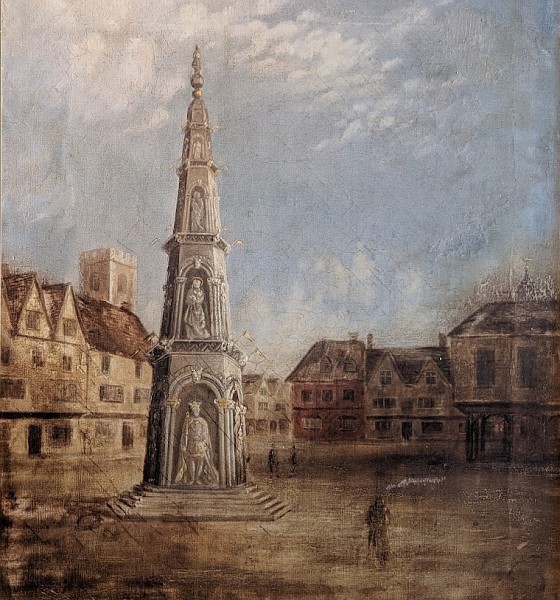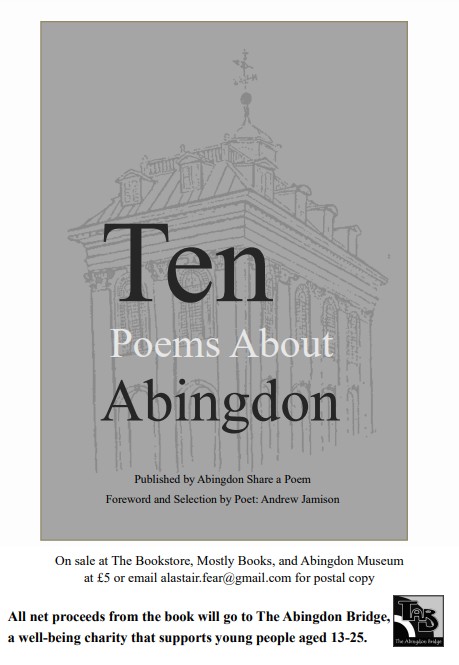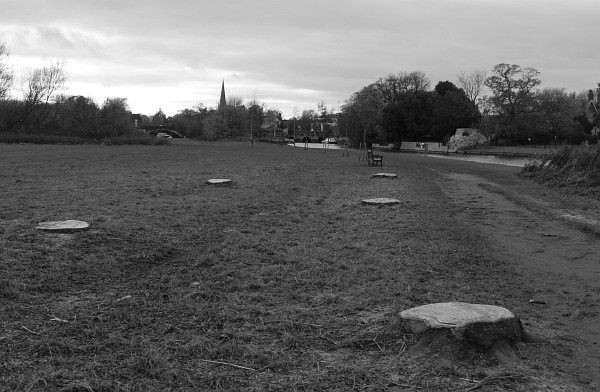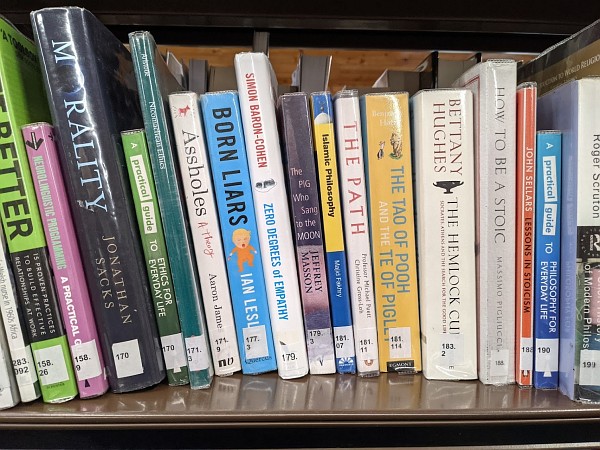
I have found a few older poems, and some folk verses, that might find their way into the proposed book Ten Abingdon Poems.
Serjeant Richardson, the town’s mace bearer, wrote the following poem after the celebrations in Abingdon, on 7th September 1641, when war with Scotland was avoided. A year later the Civil war had begun, and the Abingdon Cross, mentioned in this poem, was destroyed. The picture of the cross above belongs to Abingdon-on-Thames Town Council and a copy is printed in the museum.
Once you get used to the spelling with Vs being used for U etc., it is worth saying that I think:
* Calena is Oxford;
* Cissa was the founder of the original Abbey;
* not sure why St Helen’s bells are Aarons bels, but Aaron was the high priest, and the elder brother of Moses;
* many students from the nursery of Royse School went on to grow further in Pembrook College in Oxford;
* Nepenthes liquour is a drug for sorrow that causes forgetfulness;
* Hyperions son (Hyperion along with his son Helios was a personification of the sun);
* the figure of King David, who wrote some of the psalms, was on the old Market Cross;
* Helvian liquor, and rich Maligo could be Roman wine and wine from Malaga;
* Antelop is Abingdon’s Antiloppe Inn;
* Irus Crue could be a crew of beggars
Serjeant Richardson’s Poem – In honour of ABINGDON – 7th September 1641
(describes the town)
Not farre from faire Calena placed is
A pleasant Towne, neere silver Thamisis;
Where you may view the ruin’d Battlements
Of old King Cissas ancient Monuments
Where struts th’unparall’d, harmelesse, threatn’d Crosse
(Yet lately blest from Babylonish drosse)
Where Aarons bels in Helens Church doe ring
Peales, that doe blesse us from the poyson’d sting
Of death eternall. Neere the Church-yard Wall
Stands the faire structure of Christs Hospitall.
Where Royse his fruitfull Nurceries supplie
Great Pembrooks Gardens insufficiencie.
Of things of late, that in this Towne befell,
Something my oblieg’d Muse is forc’d to tell;
(Though but in rustick phrase) yet Ile expresse
To ABINGDON my love and thankfulnesse:
Yet Ile not Barber-like hyperbolize,
And sell my Customers a Chest of Lies:
No this Ile banish, thus I will not sin,
Il’e write no more but truth, and now begin.
(sunrise and people woken by the bells of St Helen’s and St Nicolas)
Tuesday (the seventh day of this last September,
Which day I’me sure our Children will remember)
Was by the King, and Court of Parliament
Proclaim’d a Festivall, and to be spent
In sacred wise; because ‘twixt Scots and Vs,
A joyfull peace is now concluded thus.
So soone this welcom’d newes was heard off here,
Griefe Shrunk aside, no sorrow did appeare;
Each Man by’s Cheerefull Visage, you would think
Nought but Nepenthes liquour then did drink.
The day being come, (Ile barre to complement)
And tell you briefly how the time we spent.
Ith’dawne of day, before Hyperions son
Bridl’d his horses, or his Course begun,
Old Helens trowling Bells such peales did ring,
And to our drowsie eares such tunes did sing,
(When honest Nick began to sympathise,
Striking up’s Lowbells in melodious wise)
That we no longer in our beds could lie,
But each prepar’d for this daies jubilie.
To Helens Courts (ith’ morne) at seven oth’ Clock,
(first church service)
Our Congregation in great numbers flock:
Where we till Twelve our Orizons did send
To him, that did our Kingdomes Quarrels end.
And there two Sermons two Divines did preach,
And most divinely gratitude did teach.
At twelve the Priests lips blest us; home we came,
And sung sweet Anthems to Iehovah’s name,
(second church service and procession to the Market Cross and celebrations)
At Two againe (in Clusters) we did pack,
And fill’d the Church as full as it could thwack.
Till foure we staid, and Sermon being ended,
Towards our triumphant Crosse our course was bended.
And thus we march’d. First with my golden Mace
(‘Tis fit I put my selfe ith’ formost place)
I pac’d along, and after follow’d mee
The Burgesses by senioritie.
Our Praetour first (let me not misse my Text)
I think the Clergie-men came marching next;
Then came our Iustice, with him a Burger sage,
Both march’d together in due equipage:
The rest oth’ Burgers, with a comely grace,
Walk’d two, and two along to th’ Market-place;
And after them, hundreds both young and old
Crowding along, that time you might behold.
(Being come to th’ famous Crosse, our journies end)
Her mounting Stayres in state we did ascend;
The Clerk was call’d, and he a Bible took,
The hundred and sixt Psalme he out did look,
Two thousand Quoristers their notes did raise,
And warbled out the great Creatours praise:
Their thundring Eccho gave so great a shout.
Nicklas and Helen were quite baffl’d out.
Over my head I saw King David stand,
Listning to th’Musick, with his Harp in hand,
Sure when the Psalmist liv’d, with’s sacred Lire,
He seldome play’d, or sung to such a Quire,
If either King could speake, hee’d sweare by’s Crown
No haire-braind Separatist would pull him downe:
For why, this heavenly joy, we had so late,
Did seeme, in part, the Crosse to consecrate.
The Psalme is ended: but the Folke begin
Lowder, and lowder crie, God save the KING,
While Bonfires blaze, their caps are throwne away,
All to expresse the triumph of the day.
The Helvian liquor, and rich Maligo,
And English beere, our Senate did bestow:
No cost was spar’d, and yet I must confesse,
I saw no shew of brutish drunkennesse:
Sure some diviner hand, that day did guide
The Vulgar, that they should not slip aside,
And further to set forth a greater joy,
Out comes the skilfull Sergeant Corderoy,
With’s his ratling Drummes, and Fife, and Colours flying,
With’s Musketteeres (and yet ther’s none fear’d dying)
Bravely they march’d about; but made a stop,
When they drew neere the well knowne Antelop;
A fiery peale they rung ith’ Senate Eares,
(Gallantly done by warlike Musketteeres)
(escourted the Mayor home)
Anon they made a Guard, my noble Master
March’t through them to the front, (but yet no faster
Then my Mace and I) safely did they guard
The Kings Lieutenant home, when in his yard,
Or Court, another peale they out did thunder,
Which made the thronging people shout and wounder;
Their Muskets having shot out all their powder,
They made their Throats their Muskets, and shot lowder;
Such was their joy (a Barrell being spent)
In sober manner every man home went.
(comments on the evening’s street parties, how Abingdon outdid other places, and the charity given to the poor)
And them with speed follow’d my Muse and I,
To learne what further newes we could descrie.
And now ’tis supper time. In every street
Neighbours with Neighbours at some house did meet
Their monies joyn’d together for a Feast,
And each to other is a welcome Guest.
(Supper being done) anon they ‘gin to sing.
Some joyfull Hymne (a joyfull revelling)
Travell my Muse, goe, wander up and downe,
Search into City, Village, Hamlet, Town,
Tell me at thy returne (if thou canst tell)
Where any Feast with ours could parallell.
And yet this was not all; for what was spent
On Irus Crue, made the full complement
Of this daies jubilie, this was the best
Of Sacrifice, this season’d all the rest.
Vpon this day the poore were not neglected,
Thirteene or Foureteene pounds were here collected
And some (no question) out of Charitie,
In private gave to their necessities.
(concludes)
Thus have I shew’d you in a home spun way,
(Yet true enough) how we this happy day
Did from the morning to the evening spend;
But I am weary, and I’le make an end.



